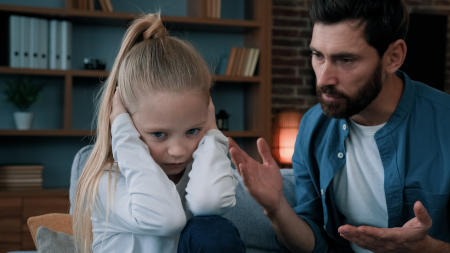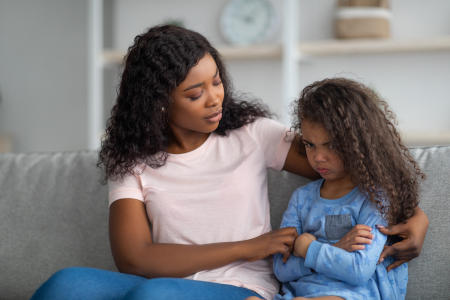With young children: meltdowns, acts of defiance, physical aggression, and impulsiveness are just some of the things that cause parents to feel overwhelmed and without hope. Luckily, PCIT is an effective therapy designed to help caregivers strengthen their bond with their child and solve these problems. PCIT is a method scientifically proven to help with raising a strong-willed child. A certified therapist coaches while the parent plays with their child. Play is often considered the language a child uses, which is why it’s the perfect opportunity to teach children the skills needed to listen to their parents better. Also the play bonds the child stronger so that when limits are set the child wants to obey. 4KidHelp & Adults is one of the few local practice which offers this specialized service.
Parent Child Interaction Therapy (PCIT)

What is PCIT?
Parent Child Interaction Therapy – also known as PCIT – is an evidence-based treatment program designed for caregivers and their young children (2 to 7 years old) who are experiencing social, behavioral, and/or emotional difficulties.
PCIT is regarded by national expert panels as a gold standard treatment for children who have any of the following challenges:
Behaviors
- Frequent temper tantrums
- Strong-willed children
- Defiance – refusing to follow directions
- Verbal and/or physical aggression
- Destruction of toys and/or family belongings
- Backtalk or sassing adults
- Whining or crying for no apparent reason
- Constantly seeking attention
- Hyperactivity
- Interrupting others
- Short attention span
- Difficulty with behaviors at school, preschool, and/or daycare
Disorders
- Oppositional Defiant Disorder
- Attention-Deficit Hyperactivity Disorder
- Conduct Disorder
- Posttraumatic Stress Disorder
- Children with Maltreatment and Trauma
- Bipolar Disorder
- Anxiety Disorders
PCIT Therapy Structure
PCIT therapy is implemented in two phases: (1) the Child-Directed Interaction Phase (CDI) where parents develop child-centered interaction skills to enhance the parent-child relationship; and (2) the Parent-Directed Interaction Phase (PDI) where caregivers learn additional behavior management skills. PCIT gives equal attention to the enhancement of the parent-child relationship, and the development of caregivers’ behavior management skills.
During the first phase of PCIT therapy (the Child-Directed Interaction Phase), the golden rule is for the caregivers to “follow the child’s lead.” Children are encouraged to lead the play activity while their caregivers follow along using the PRIDE skills. The CDI Phase of PCIT aims to enhance the parent-child relationship by maximizing positive communication, attention, and imitation during child-led play. Click here for more detailed information on the CDI Phase of PCIT.
In the second phase of PCIT therapy (the Parent-Directed Interaction Phase), caregivers learn to use effective commands and implement additional behavior management strategies for any remaining challenging behaviors (e.g., aggression, destruction). The overall goal for PDI is to create a supportive home environment by helping caregivers become consistent, predictable, and follow through with behavior management skills. Click here for more detailed information on the PDI Phase of PCIT.
Each phase of PCIT (CDI Phase & PDI Phase) begins with a didactic, “Teach Session” where PCIT therapists meet only with the child’s caregiver(s). During PCIT Teach Sessions, the skills that will be used in each phase are taught, modeled, and role-played with the caregiver(s). Teach sessions are followed by “PCIT Coaching Sessions” where the therapists use scaffolding, prompting, reinforcement, and selective attention to shape a caregiver’s utilization of PCIT skills. To help caregivers become proficient in PCIT skills (and to increase the generalization of PCIT skills outside of sessions), parents are coached in real-time while they are playing with their child. Live coaching of behavior management strategies is a hallmark of PCIT.


Scientifically Proven to Work
Over the past 5 decades, PCIT has been scientifically tested in over 300 research studies and the results of those studies have been published in the top journals within the field of psychology.
In the 1970’s, Sheila Eyberg, Ph.D. developed Parent Child Interaction Therapy as a behavioral family approach for the treatment of young children exhibiting disruptive behavior problems. Today, PCIT is one of the most researched, and scientifically successful parent training programs for children around the world. According to the State of Oregon Health Authority PCIT is more likely to work more often than traditional treatments offered around here:
- 4 times more likely to work than “Triple P”
- 3 times more likely to work than standard therapy or the Incredible Years
- 5 times more likely to work than stimulant medication
PCIT integrates components of social learning theory, attachment theory, developmental theory, behavioral principles, and traditional play therapy. The goal of PCIT is to improve the quality of the parent-child relationship by helping caregivers adopt an authoritative parenting style [parent in lovingly in charge], which incorporates a child’s needs of warmth, psychological autonomy, and limit setting to achieve optimal outcomes. Attachment theory principles used in PCIT focus on helping the parent facilitate a warm, supportive relationship as a basis for the development of social skills and emotional regulation. From a social learning perspective, PCIT uses differential attention to address behavioral problems, in addition to having the parent model calm, desired behaviors during parent-child interactions. Additionally, PCIT incorporates authoritative parenting practices by outlining consistent child-rearing practices – with an appropriate balance between nurturance and appropriate limit-setting.
Effectiveness of PCIT
Effectiveness of PCIT
Empirical research has consistently demonstrated that PCIT therapy has resulted in a wide range of improvements for families, including but definitely not limited to, the following:
- Increased feelings of security, safety, and attachment with caregiver(s)
- Increased attention span
- Increased self-esteem
- Increased pro-social behaviors (sharing, taking turns)
- Decreased frequency, severity, and/or duration of tantrums
- Decreased hyperactivity
- Decreased negative attention-seeking behaviors (whining, bossiness)
- Decreased caregiver frustration
- Increased compliance with adult (caregivers, teachers) requests
- Increased caregiver confidence (and decreased stress)
- Improved behavior at home, and in public
- Decreased frequency, severity, and/or duration of aggressive behavior
- Decreased frequency of destructive behavior
- Decreased defiance

Your Commitment
You and your child will come into our office in Canton, OH for 16-20 hour-long personalized coaching sessions. These sessions are billed to your insurance company. You are expected to practice these techniques with your child 5 minutes every day. Once you have completed the program, think about all of the time you will save not having to correct tantruming behaviors! This time can be put into loving interactions with your child, bonding the 2 of you even further.
Learn More?
If you would like to speak with Tyler, our PCIT Trainer, please fill out this brief form and we will get back to you shortly:

